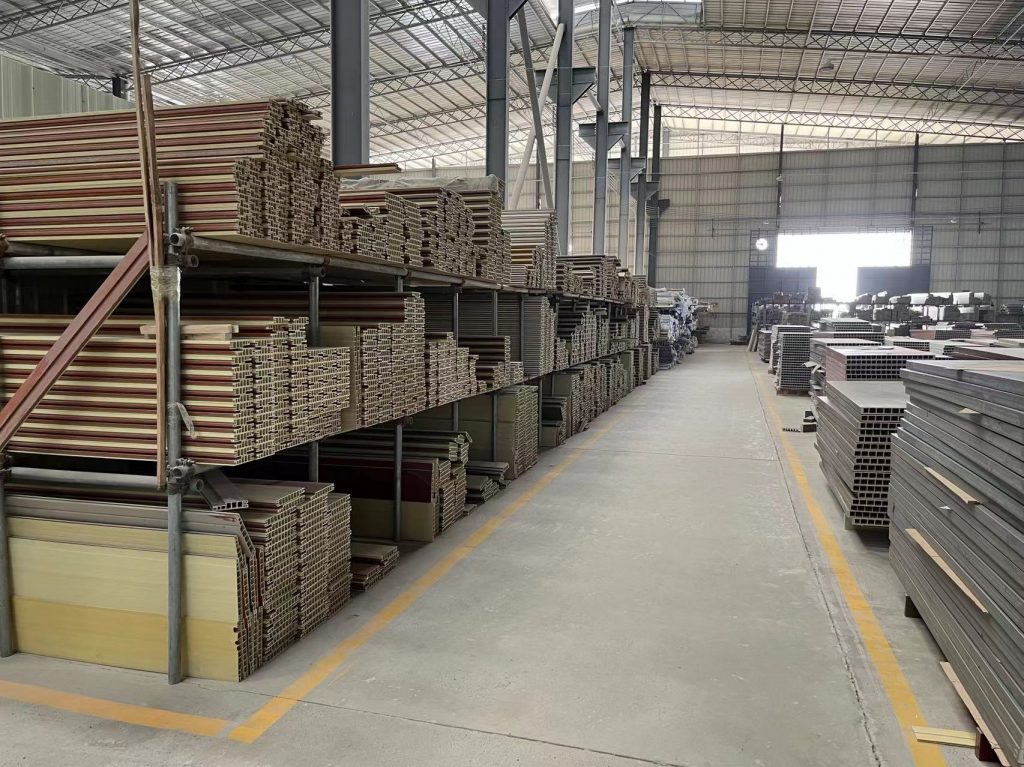A WPC (Wood Plastic Composite) door factory specializes in producing high-quality doors made from a combination of wood fibers and plastic materials. These factories utilize advanced manufacturing techniques to create durable, water-resistant, and eco-friendly doors for residential, commercial, and industrial applications. Here’s an overview of what goes into a WPC door factory, its manufacturing process, and the advantages of WPC doors.
Key Features of a WPC Door Factory
1. Advanced Technology and Equipment
WPC door factories use state-of-the-art equipment to blend wood fibers with recycled plastic materials, creating the composite material that is both strong and lightweight. The production process typically involves:
- Extrusion machines to form the WPC material into specific profiles.
- Molding presses to shape and create door frames, panels, and decorative elements.
- CNC machines for precise cutting and shaping of the door components.
- UV coating technology to enhance the doors’ color retention and weather resistance.
2. Eco-Friendly Production Process
The production of WPC doors focuses on sustainability and reducing the environmental impact. By utilizing recycled wood fibers and plastic, WPC door factories contribute to waste reduction and the recycling industry. Additionally, WPC doors are 100% recyclable after use, making them an environmentally responsible choice.
3. Customization and Versatility
Factories that produce WPC doors often offer a range of customization options, allowing clients to choose:
- Colors and finishes: WPC doors can be made to resemble wood, with a variety of color options and textures, such as oak, walnut, or teak.
- Sizes and styles: WPC doors can be manufactured in different styles, including panel doors, flush doors, bi-fold doors, sliding doors, and more.
- Additional features: Some factories also offer fire-resistant, soundproof, and thermal-insulating WPC doors, depending on the specific requirements of the customer.
Advantages of WPC Doors Made in a Factory
1. Durability and Strength
WPC doors are known for their high durability. They are resistant to:
- Water and moisture: Ideal for bathrooms, kitchens, and areas with high humidity.
- Termites and pests: Unlike wood, WPC does not attract termites, making it a more durable option for long-term use.
- Cracking and warping: WPC doors maintain their shape and strength even under extreme conditions.
2. Low Maintenance
WPC doors are incredibly low-maintenance. They do not require painting or sealing, unlike traditional wooden doors, and can be easily cleaned with a damp cloth. Their weather-resistant properties ensure they continue looking good for years with minimal upkeep.
3. Eco-Friendly Choice
The recycled materials used in WPC door manufacturing help reduce waste and support sustainable building practices. Since WPC doors are also recyclable after use, they contribute to a greener environment.
4. Aesthetic Appeal
WPC doors offer a modern aesthetic and come in a wide variety of designs, making them suitable for all types of homes and commercial spaces. The ability to mimic the appearance of real wood without the associated maintenance is a significant advantage.
Applications of WPC Doors
WPC doors are suitable for use in a wide range of environments:
- Residential Homes: WPC doors are perfect for bedrooms, bathrooms, kitchens, and entrances due to their moisture and pest resistance.
- Commercial Buildings: WPC doors are used in offices, hotels, and retail shops, providing durability and professional appeal.
- Industrial Settings: WPC doors can withstand rough conditions, making them ideal for factories and warehouses.
Conclusion
A WPC door factory produces doors that offer a unique combination of strength, sustainability, and style. The doors are perfect for a variety of applications due to their durability, low maintenance, and eco-friendly properties. Whether you are building a new home, renovating, or outfitting a commercial property, WPC doors provide an ideal solution that aligns with modern, sustainable living.
